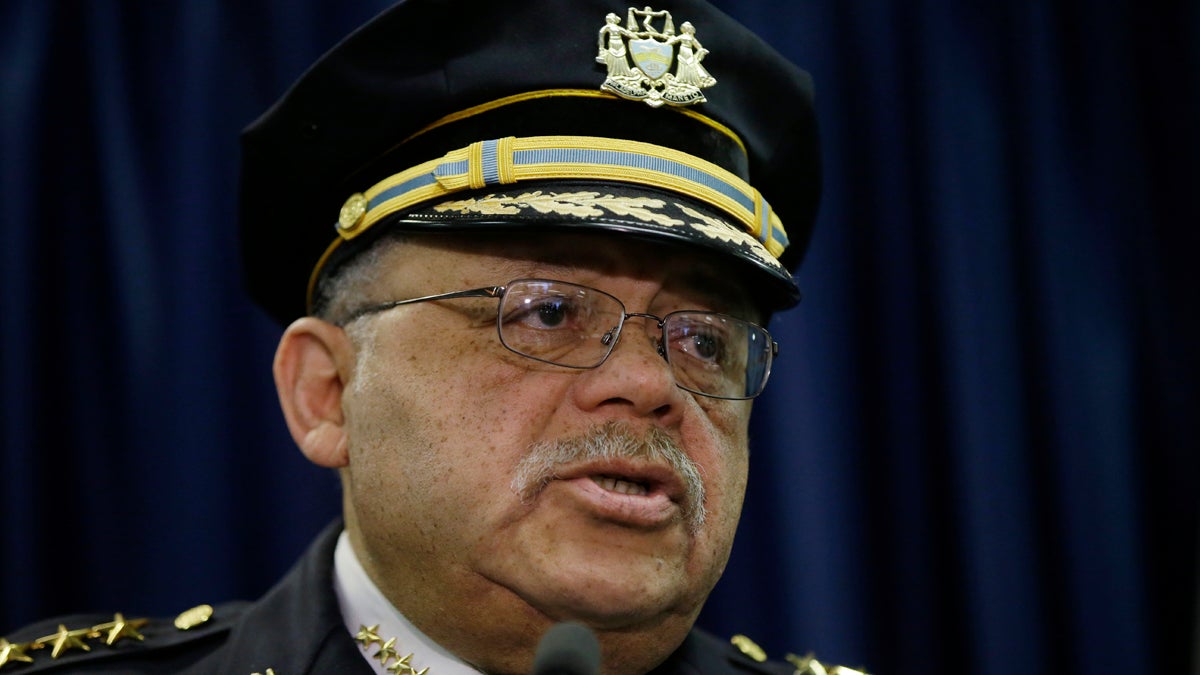Justice Department report isn’t enough to change the police
Listen
Philadelphia Police Commissioner Charles Ramsey speaks during a news conference Monday, March 23, 2015, in Philadelphia. Poor training has left Philadelphia police officers with the mistaken belief that fearing for their lives alone is justification for using deadly force, the Justice Department said Monday in a review of the city’s nearly 400 officer-involved shootings since 2007. (Matt Rourke/AP Photo)
On Monday, when the Justice Department released its report recommending changes in the Philadelphia Police Department’s use of deadly force policies, I thought of the first time I saw police brutality.
I was 14, my parents had just divorced, and I’d only recently moved to North Philadelphia from West Oak Lane.
As a child who’d spent his life in a working class neighborhood prior to moving to a place where poverty was more prevalent, I’d never before had reason to fear the police.
But on that day, as my brother and I stared down from a third floor window, I learned what it meant to be black in a poor community. I learned what it meant to be vulnerable.
My brother and I watched as two white police officers grabbed a black man on the corner of 25th and Oxford, slammed him against the hood of their police cruiser, and beat him with their batons until his blood smeared the hood of the car like thick, red paint.
“Get his badge number!” the man yelled repeatedly.
But even as his voice echoed in the afternoon air, I knew no one would get the officers’ badge numbers. Perhaps more sadly, I knew it wouldn’t make a difference if they did.
I think of that day whenever I hear claims about excessive force by police. I think of it, because on that day—at the tender age of 14—I realized that my community’s experience with police was different than that of my white classmates. While they could view every police officer as a friend, I could not, because there was always the risk that the blood at the end of the baton could be mine.
As I grew older, the memory of that day faded beneath layers of life experience. I learned that not all police officers are the same. But I also learned that the brutality we suffered under former police commissioner Frank Rizzo did not die at the hands of federal investigators. It simply changed form, and in some ways, became even more deadly.
That reality came to light in 2012, when Philadelphia police shot 52 suspects, killing 15. It was then that Philadelphia Police Commissioner Charles Ramsey requested the Justice Department review. The resultant report focused on the use of deadly force over a seven-year period.
The Justice Department’s findings include: Serious deficiencies in the department’s use of force policies and training; inconsistent supervision and control of officer involved shooting investigations and crime scenes; and woefully insufficient oversight practices.
The report prescribes 91 recommendations to help the department improve, including the use of an external independent investigative agency to review all police shootings of unarmed individuals.
But while I am heartened by the Justice Department’s recommendations, I am saddened that so little has changed. Of the 364 police shootings that took place over the 7 years covered by the report, 55 of them were in the 22nd police district—the same place I lived when I looked out my window and saw that man beaten by police.
Commissioner Ramsey says some of the changes the Justice Department recommends are already in the works. That’s good.
But if the police department is truly going to change the way it works in Philadelphia’s poorest communities, both the leadership and the rank and file will have to dig deeper, and have a serious conversation about the way some officer view people of color.
Because you can’t continue to brutalize people for decades if you believe in their humanity. That’s why it will take more than a change in training to stop police brutality. Ultimately, it will take a change of heart.
Listen to Solomon Jones M-F from 7-10 am on 900 am WURD.
WHYY is your source for fact-based, in-depth journalism and information. As a nonprofit organization, we rely on financial support from readers like you. Please give today.


